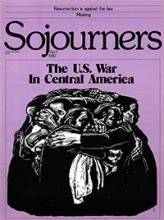Month after month in "Euclid Street Journal" we have shared bits and pieces of our lives as a community. We have told about our hopes, dreams, and successes. Sometimes we have also shared our sorrows. This month we share with you our grief and disappointment at the closing of our child development center at the end of February (for a history of the center see the April, 1981 "Euclid Street Journal").
Our first pilot program in daycare opened in November, 1976, in one of our households, with eight children from our neighborhood. In November, 1977, we opened a larger center in the basement of a low-income housing project owned by HUD. The goal of the center was to provide affordable child-care to low-income, working people as well as offering school preparation.
During the next three years, demand for service was greater than we could provide, and we slowly expanded to try to meet that growing need. By the spring of 1980 we had to make a decision whether to continue to run a smaller, church-related center that would rely heavily on Sojourners for direction and staffing or to organize a larger neighborhood center of which Sojourners would be a smaller contributing part. This second option would mean pulling together a coalition within the neighborhood to take responsibility for the center.
After much discussion we chose the latter course, and in the summer of 1980, gathered a Board of Directors of four parents, four neighborhood leaders, and four members of Sojourners. Our choice also meant that we had to expand the number of children in the program and obtain a substantial amount of funding from outside sources.
At first everything went well. The Board was enthused, the tenant association in the apartment building offered its support, and it seemed like we would finally be able to whittle down our list of families waiting to enroll their children when a space became available.
Read the Full Article

